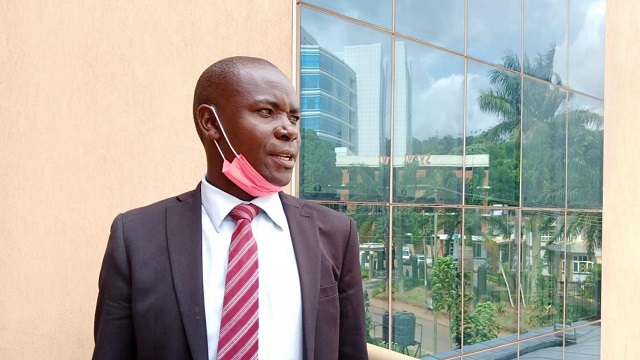
Kampala, Uganda | THE INDEPENDENT | The Solicitor General Francis Atoke has advised government not to disclose contents of the documents related to the East African Crude Oil Pipeline Project to third parties because they contain confidential information.
The Solicitor General reveals this in his advice dated August 4th, 2021, to the Permanent Secretary Ministry of Energy and Mineral Development Robert Kasande (now former), who wrote to him seeking to be guided on what to do after a request for the documents by city lawyer Male Mabirizi.
In April 2021, President Yoweri Museveni on behalf of Uganda signed the East African Crude Oil Pipeline Project-EACOP agreement with his Tanzanian counterpart Samia Hassan Suluhu.
The 3.5 billion dollar project in issue paved way for the construction of a 1,440 kilometer crude oil pipeline from the Albertine region of Uganda to Tanzania’s seaport of Tanga.
But after the agreement, on April 12th 2021, Mabirizi wrote to the former Permanent Secretary of Ministry of Energy and Mineral Development demanding for access to the host government agreement for the pipeline, HGA, Tarrif and Transportation Agreement-TTA and Share Holding Agreement-SHA.
“This is very important when it comes to oil because in many countries, public officers have used oil resources for their personal enrichment to the detriment of citizens despite huge revenues from oil”, wrote Mabirizi. “There is information linking Uganda government senior officials involved in the pipeline project to corruption related offences, hence the need to access the agreements to ensure that any criminality or wrong doing is quickly detected and perpetrators dealt with as soon as possible”.
Quoting the Access to Information Act, Mabirizi said that the ministry had no option but to grant him access.
On April 13th, 2021, Robert Kasande, the former Permanent Secretary to the Ministry of Energy and Mineral Development wrote to the Solicitor General seeking his legal guidance, taking into account the commercial nature of the agreements and confidentiality provisions therein.
In response to the Permanent Secretary’s letter, the Solicitor General in a letter written on his behalf by Mary Nankabirwa which URN has seen, says that, “all the three contractual agreements contain a confidentiality clause which prohibits disclosure of information of a financial, technical or commercial nature relating to EACOP project to any third party except with consent of the other party or where the disclosure is allowed by law or disclosure is as a result of a court order or required in court proceedings”.
“The HGA, TTA and SHA set out in detail crucial and commercially sensitive business information concerning financial, technical and commercial aspects of the EACOP project which information was provided in confidence by the investors to government,” reads the letter in part, adding, “The parties agreed to the confidentiality clause in the said documents in order to give legal protection to trade secrets, proprietary information, business data and business intelligence among others enshrined in the said documents.”
According to the Solicitor General, in his opinion such information which is proprietary and confidential to investors and the host state, enjoys protection by the law in order to protect the commercial secrets and to guard against undesirable competitive practices.
He adds that the Ugandan government agreed to keep it confidential and therefore disclosing the agreements to the public, it would be breach of a duty of confidence owed to the investors and, “Such disclosure would affect future disclosure of similar information by the investors in relation to the EACOP project for the entire duration of the project estimated for 25 years, to the detriment of the oil and gas sector.
We have also noted that the EACOP project is being financed with HGA, TTA and SHA, providing primary security to lenders. In our view, disclosure of the above contractual documents is likely to undermine the bankability of the EACOP project (as disclosure is likely to disadvantage the investors in the course of commercial negotiations for project finance with the lenders) with detrimental consequences to Uganda and the people of Uganda as whole.
The Solicitor General further indicates that the Constitution and the Access to Information Act while guaranteeing the right to access to information recognized the fact that such right should not prejudice security or interfere with the right to the privacy of any other person.
“Since the above mentioned documents contain information of a confidential nature for both investors and the government as described above, disclosure of the same would not only amount to infringement of the investors’ right to privacy which is protected under article 42 of the Constitution and Section 5 of the Act, but may pose threat to the security of the trans boundary pipeline and national security,” reads the advice.
Now, the Solicitor General says if Mabirizi is suspecting that any criminal act was committed in relation to the EACOP project, he may report the matter to the offices by law mandated to handle criminal cases.
Mabirizi has since filed an application seeking to compel the government to disclose the documents in question before Mengo Chief Magistrates Court.
But Irene Batebe, the current Permanent Secretary to the Ministry of Energy and Mineral Development has since opposed Mabirizi’s demand, concurring with the Solicitor General’s advice.
National courts previously ruled that not everything that government holds in trust for its people must always be disclosed and that disclosure of oil documents is likely to cause the prospecting companies to withdraw which is detrimental to the country’s interests.
*****
URN
 The Independent Uganda: You get the Truth we Pay the Price
The Independent Uganda: You get the Truth we Pay the Price



